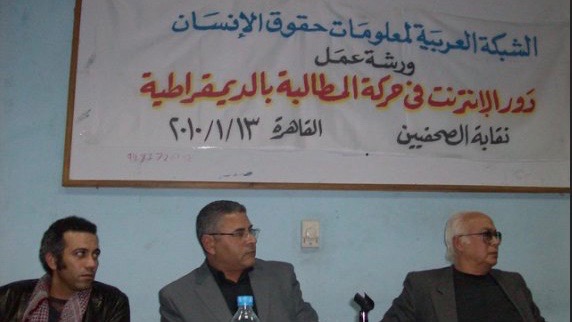The Arabic Network for Human Rights Information (ANHRI), one of the last remaining civil society organizations in Egypt, announced an indefinite suspension of its activities in the country in a statement on Monday, January 10. The human rights organization cited constant state persecution and harassment as the reason for its decision.
In the statement, ANHRI claimed that “with the increasing disregard for rule of law, growing violations of human rights which did not exclude institutions and independent defenders of human rights and increase in police persecutions,” it is unable to carry on with its activities.
ANHRI was established in 2004 by lawyers and activists working in the field of human rights. Its activities included primarily recording human rights violations against citizens, political prisoners and journalists across the country and highlighting cases of victims of state persecution. It also documented protests against such violations and worked to defend human rights in Egyptian courts.
In its statement, ANHRI accused government agencies of constant harassment of its staff and even attempts to recruit some of them to spy on the organization’s activities. It also published a list of major acts of harassment, claiming that ever since the Abdel Fattah al-Sisi regime took power through a military coup in 2013, the organization has been subjected to various kinds of targeting. These included actions like illegal seizure of its publications, blocking of its website within hours of its launch, seizure of its office furniture and other materials from time to time, arrest of its deputy executive director, Rawda Ahmed, and defamation of its executive director, Gamal Eid, who has been prevented from traveling abroad and has his property attached since 2016. This is similar to several other human rights activists in the country, such as Mohammad Lotfy, director of the Egyptian Commission for Rights and Freedoms.
In the absence of the bare minimum of the rule of law and respect for human rights
The Arabic Network for Human Rights Information decides to suspend its activitieshttps://t.co/H6nOjXT7HL pic.twitter.com/GSknFylvBD
— ANHRI-الشبكة العربية (@anhri) January 10, 2022
A case was filed against ANHRI 11 years ago for receiving foreign funds and maligning the image of the state, namely Civil Society Case no-173. Amendments made by the al-Sisi government in 2014 to the law mean that such violations may now result in a 25-year prison sentence for those convicted.
Despite the organization suspending its activities, the executive director Eid pledged to continue work towards promoting human rights in the country as an individual, along with the other remaining human rights groups.
Coming to power within two years after the popular uprising of 2011, al-Sisi’s government unleashed a mass persecution campaign against all forms of opposition and civil society groups by using the legal and security apparatus of the state.
The al-Sisi regime has banned the activities of Muslim Brotherhood, the main opposition party, calling it a terrorist organization. It also banned all protests and strikes in the country and imposed an emergency which was only formally lifted last month. It has arrested thousands of political and human rights activists and journalists, scores of whom have died in prison under suspicious circumstances.





